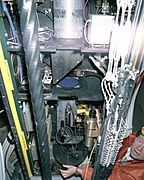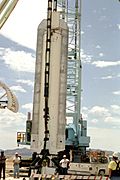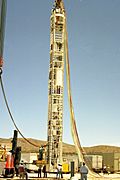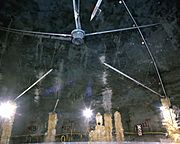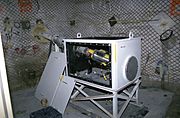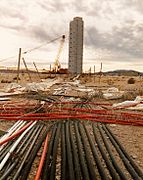Operation Julin facts for kids
Quick facts for kids Julin |
|
|---|---|
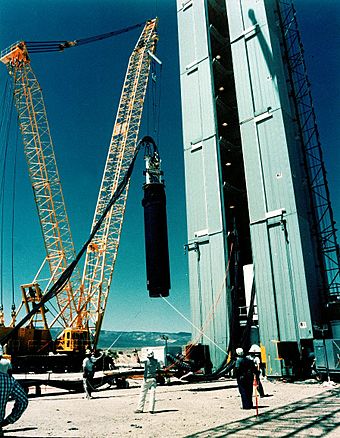
Equipment being lowered into the hole for Julin Divider.
|
|
| Information | |
| Country | United States |
| Test site |
|
| Period | 1991–1992 |
| Number of tests | 7 |
| Test type | underground shaft, tunnel |
| Max. yield | 100 kilotonnes of TNT (420 TJ) |
| Navigation | |
| Previous test series | Operation Sculpin |
Operation Julin was a series of 7 nuclear tests carried out by the United States. These tests happened between 1991 and 1992. They took place after another series called Operation Sculpin. Operation Julin was the very last group of nuclear tests before talks began for the Comprehensive Test Ban Treaty. This treaty aimed to stop all nuclear explosions.
Contents
What Was Operation Julin?
Operation Julin was a set of underground nuclear tests. These tests helped scientists learn more about nuclear weapons. They also helped check the safety of these weapons. The tests were done deep underground in shafts or tunnels.
Key Experiments in Operation Julin
Scientists used these tests to gather important information. Each test had a special purpose.
Diamond Fortune Test
The Diamond Fortune test looked at how an explosion's energy moved through the air. This test happened in a special half-dome shaped room. The room was about 11 meters (36 feet) wide. The explosion was set off about 4 meters (13 feet) above the floor. One part of the floor had regular soil. The other part had a material that acted like snow. This helped scientists study how the blast affected different surfaces.
Hunters Trophy Test
The Hunters Trophy test included an experiment called Hydroplus. The Defense Nuclear Agency (DNA) used this to check for secret nuclear tests. They measured how much the ground shook and moved. This was done at different distances from an explosion. Computers helped them understand these measurements. The Hydroplus experiments needed special information to work. This information was gathered during tests like Distant Zenith in Operation Sculpin.
Tests That Were Planned But Cancelled
Three nuclear tests were being prepared when all future testing stopped. This stop was called a moratorium. These planned tests were named Icecap, Gabbs, and Greenwater.
Icecap Test Details
The Icecap test was supposed to happen in the spring of 1993. It was planned to have a power between 20 and 150 kilotons. This test would have been set off about 1557 feet (475 meters) underground. A very heavy container, weighing 500,000 pounds (226,796 kg), was already at the site. This container held many experiments.
Some of the experiments inside included:
- THREX: This experiment used special sensors to find tiny particles from the explosion.
- PINEX: This used a small hole to focus radiation onto a screen.
- NUEX: This measured how many neutrons were released.
- TOMEX: This took pictures of the device using a special camera.
These experiments used long pipes to guide radiation from the explosion to them.
Gabbs and Greenwater Tests
The Gabbs test was planned for early 1993. Unlike Icecap, its experiment container was not yet ready. The Greenwater test was also planned. Both of these tests were cancelled when the moratorium began.
List of the Julin Nuclear Tests
This table shows the nuclear tests that were part of Operation Julin.
| Name | Date and Time (UT) | Local Time Zone | Location | Depth Underground | Purpose of Test | Device | Power | Fallout | References | Notes |
|---|---|---|---|---|---|---|---|---|---|---|
| Lubbock | October 18, 1991 19:12:00.0 | PST (–8 hrs) | NTS Area U3mt 37°03′48″N 116°02′46″W / 37.06338°N 116.04616°W | 457.2 m (1,500 ft) | underground shaft, weapons development |
53 kt | Some gas escaped, 0.1 Ci (3.7 GBq) | |||
| Junction | March 26, 1992 16:30:00.0 | PST (–8 hrs) | NTS Area U19bg 37°16′21″N 116°21′38″W / 37.27241°N 116.36065°W | 622 m (2,041 ft) | underground shaft, weapons development |
100 kt | This test helped check if treaties were being followed. | |||
| Diamond Fortune | April 30, 1992 16:30:00.0 | PST (–8 hrs) | NTS Area U12p.05 37°14′03″N 116°09′30″W / 37.23413°N 116.15823°W | 236 m (774 ft) | tunnel, weapon effect |
3 kt | Some gas escaped, 0.2 Ci (7.4 GBq) | |||
| Victoria | June 19, 1992 16:45:00.0 | PST (–8 hrs) | NTS Area U3kv 37°00′19″N 116°00′40″W / 37.00537°N 116.01101°W | 244 m (801 ft) | underground shaft, weapons development |
80 t | ||||
| Galena-Green - 3 | June 23, 1992 15:00:00.07 | PST (–8 hrs) | NTS Area U9cv 37°07′26″N 116°01′56″W / 37.12384°N 116.03232°W | 1,269 m (4,163 ft) + | underground shaft, safety experiment |
less than 5 kt | Three tests happened at the same time, in the same hole. | |||
| Galena-Orange - 2 | June 23, 1992 15:00:00.07 | PST (–8 hrs) | NTS Area U9cv 37°07′26″N 116°01′56″W / 37.12384°N 116.03232°W | 1,269 m (4,163 ft) + | underground shaft, safety experiment |
less than 5 kt | Three tests happened at the same time, in the same hole. | |||
| Galena-Yellow - 1 | June 23, 1992 15:00:00.072 | PST (–8 hrs) | NTS Area U9cv 37°07′26″N 116°01′56″W / 37.12384°N 116.03232°W | 400 m (1,300 ft) | underground shaft, weapons development |
less than 5 kt | Three tests happened at the same time, in the same hole. | |||
| Hunters Trophy | September 18, 1992 17:00:00.078 | PST (–8 hrs) | NTS Area U12n.24 37°12′25″N 116°12′39″W / 37.20687°N 116.21085°W | 385.3 m (1,264 ft) | tunnel, weapon effect |
4 kt | Some gas escaped, 1 Ci (37 GBq) | This test included the Hydroplus experiment. | ||
| Divider | September 23, 1992 15:04:00.0 | PST (–8 hrs) | NTS Area U3ml 37°01′14″N 115°59′20″W / 37.02063°N 115.98878°W | 426 m (1,398 ft) | underground shaft, weapons development |
5 kt | Some gas escaped, 0.1 Ci (3.7 GBq) | This was the very last U.S. nuclear test. It was done to make sure nuclear forces were safe. |
Gallery
- Operation Julin
 | Stephanie Wilson |
 | Charles Bolden |
 | Ronald McNair |
 | Frederick D. Gregory |


